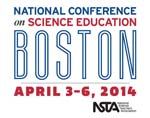“Science and Literacy: A Symbiotic Relationship”: Featured Strand at NSTA’s 2014 National Conference on Science Education in Boston, MA, April 3–6
By Lauren Jonas, NSTA Assistant Executive Director
Posted on 2014-01-07
 This April, the National Science Teachers Association (NSTA) will feature a special strand “Science and Literacy: A Symbiotic Relationship” at our 2014 National Conference on Science Education, in Boston, April 3–6.
This April, the National Science Teachers Association (NSTA) will feature a special strand “Science and Literacy: A Symbiotic Relationship” at our 2014 National Conference on Science Education, in Boston, April 3–6.
Attention to literacy is often seen as taking time away from science. In fact, built right into the Common Core State Standards, ELA, literacy can and should be used to enhance the effective teaching of science. Well-designed and integrated science and literacy instruction creates a symbiosis that supports classroom practice and student achievement. The investigation of science concepts within the elementary classroom enhances the development of reading, writing, and communication skills. At the upper grades, strengthened literacy skills continue to empower all students to access the science content and communicate their understanding. This strand will address how literacy and science are in service to each other across the learning continuum.
Sessions organized around this strand include a featured presentation on Saturday April 5, 3:30–4:30 PM (“Reading and Writing Science: What Should Be My Line?”) by Wendy Saul (Professor and Allen B. and Helen S. Shopmaker Endowed Chair, College of Education, University of Missouri–St. Louis: St. Louis, MO). More sessions on Science and Literacy include the following:
- ELL Strategies and How They Relate to Science Achievement Scores
- Closing the Achievement Gap with Constructed Response
- The 4Cs and Science: Incorporating 21st-Century Learning and Innovation Skills into K–12 Curricula
- Get to the Point: Techniques for Downhill Writing
- Liberating Literacy Strategies for Today’s Science Classroom
- Merging Labs and Literature: Exciting Science Lessons Linked to Great Books
- Collaborative Editing of Student Work Online in Science and English Language Arts
- Bringing Primary Scientific Literature to the Classroom Through the Journal of Emerging Investigators
- Telling a Story with Data and Visuals: Critiquing and Creating Infographics in the Classroom
- Teaching Science Through Literacy to English Language Learners and Early Childhood Kindergarten Learners
- Active Reading of Nonfiction Text
- Tricks of the Trade 4.0: Literacy Strategies to Enhance Your Science Instruction
- Discourse—Worth Discussing!
- Expand the Popular Mary Pope Osborne’s Magic Tree House Adventures by Building in Hands-On Science Activities as They Are Read
Want more? Check out more sessions and other events with the Boston Session Browser/Personal Scheduler.
Disclaimer: The views expressed in this blog post are those of the author(s) and do not necessarily reflect the official position of the National Science Teaching Association (NSTA).

